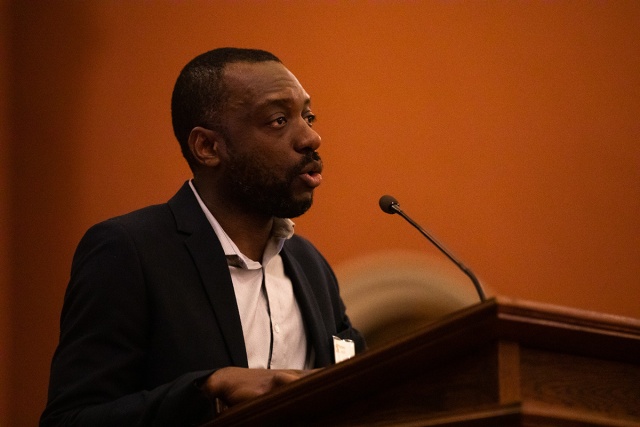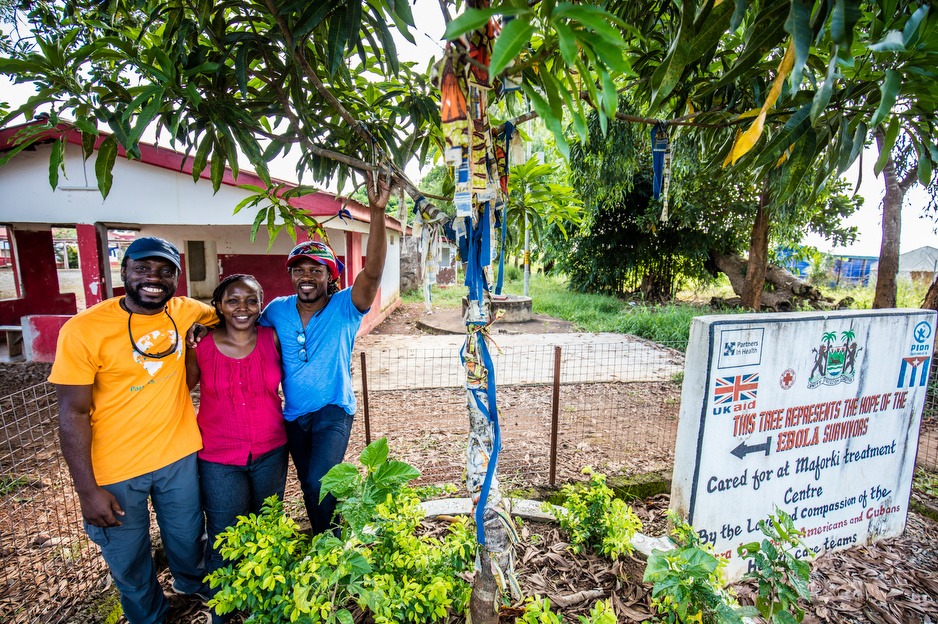Ekip Solid: A Conversation with Dr. Patrick Ulysse

Ulysse, PIH’s COO, talks about social medicine, crisis response, and his hopes for the future of global health

In a room full of people, Dr. Patrick Ulysse is usually among the last to speak. He sits, cross-legged, taking notes and listening with his whole body. He chooses his words carefully and, when he does speak, everyone in the room listens, wishes he would do so more often, and leans in to appreciate what the soft-spoken leader has to share.
Ulysse, born and raised in Haiti, had been a doctor for five years when the devastating 2010 earthquake struck. At the time, he was working for Zanmi Lasante (ZL), Partners In Health’s sister organization in Haiti, as the medical director in Centre Medical Charles Colimon at Petite Riviere, a two-hour drive north from the capital Port-au-Prince. His quick actions in the hours and days following the earthquake and, over following months, his steady management of camps for the displaced, marked him as an innovative, caring leader.
Like many Haitian clinicians before him, Ulysse took the lessons he learned at Zanmi Lasante and applied them in another country—Liberia, where he worked with partners in the national government to rebuild an ailing public health system further weakened by the Ebola epidemic. In 2019, Ulysse transitioned from his executive director role in Liberia to PIH’s chief operating officer. Over the past year, he has helped PIH navigate our global COVID-19 response and led the development of a new five-year strategic plan.
In the interview below, Ulysse shares lessons he’s learned over the course of his career in an ongoing series we’re calling Ekip Solid, or “Strong Team” in Haitian Creole. These PIH global leaders are all experts in their fields, and each interview will address how they approach leadership, share what drives them to global health work, and provide an inside look at their professional and personal passions.
You started your career with PIH in 2006 in Haiti, working as a general practitioner and managing the HIV and TB programs at a Zanmi Lasante health center. Can you tell us what you saw, heard, and experienced that drew you into this work? What about it made you want to stay with ZL, and PIH in general?
In 2005 I had just finished my medical training and was working with a medical NGO in rural Haiti providing care for persons living with HIV. The hospital where I worked did not have anti-retroviral drugs, and so I would routinely refer patients to a nearby hospital that had a supply. If these patients lived outside the hospital’s catchment area, they had to pay for the drugs. So in reality, the drugs were not available to the majority of patients I was caring for, because they could not pay.
There was one patient who was in the advanced stages of HIV and desperately needed antiretrovirals. A colleague told me they thought someone from ZL might be able to help. The physician I spoke to did not ask me who the patient was or where they were from; instead, they asked what the patient needed in addition to the medicines, and when I said food, they sent food. This was first time I had encountered a program in which components like food support were part of the care package provided to patients. After providing support for this one patient, ZL started supporting the hospital where I was working by supplying free drugs.
As a young physician, ZL was my introduction to a model of medical care in which the humanity of patients – in all its dimensions – was embraced. ZL staff did not see the person only in terms of their disease, but assessed their socioeconomic realities, their families, and their emotional health. And then, most importantly, ZL provided a system and mechanism to provide the support needed to address the social forces directly or indirectly causing illness.
I stayed with ZL over the years because I found that the mission of PIH and ZL aligned with the physician and person I wanted to be. I had become a doctor to provide care for those who most needed it, and PIH showed me what a “preferential option for the poor” could and should look like.
You’ve talked about how PIH has built a generation of physicians “who, when they see a patient, don’t just see a disease or pain, but the patient’s living situation, the patient’s social challenges, the patient’s emotional health.” Why do you think this approach is so critical? And how do we cultivate this at a structural level?
Any health care provider in the communities where we work can describe how tremendously social forces impact health. PIH has trained a generation of providers to understand the structural violence that underlies the diseases we are treating. The PIH approach is historical and anthropological and demands that we ask the hard questions about how these realities came to be.
PIH cultivates this approach at a structural level in different ways in different contexts. In many of the places where we work, we support the ministries of health in training clinicians in a year of “social service.” During this year, clinicians work through a curriculum in social medicine while embedded in a PIH clinical site where social and economic support are delivered as an essential component of comprehensive medical care.
As PIH grows and strengthens training and teaching facilities at all of our care delivery sites, such as Hôpital Universitaire de Mirebalais in Haiti, we continue to institutionalize and disseminate our approach. With our partners in Rwanda, PIH helped create the University of Global Health Equity, which is reimagining health education for doctors, nurses, researchers, and public health and policy experts, and teaching health care delivery grounded in a social justice approach. Finally, we continue our advocacy efforts at the global level, working to disseminate the knowledge gained from our experiences and transform global health policy.

In your 14-year career with PIH, you’ve responded to crises across continents—from the earthquake in Haiti as a physician to Ebola in Liberia as executive director of the country program. Now, we’re in the midst of COVID-19, and you are helping lead PIH’s response as its chief operating officer. Does this moment we’re in feel at all familiar? If so, in what ways?
This moment feels familiar in several ways. First, we see in every global health crisis – from the earthquake to Ebola to COVID-19 – that the most vulnerable people are disproportionally affected. Time and time again, marginalized communities bear the greatest burden and suffer exponentially more across all contexts. Second, each of these crises has exposed the pre-existing vulnerabilities of health systems. A health system cannot be prepared for an emergency if it does not already have functional, accessible, and equitable services. PIH focuses on strengthening public health systems so when disaster strikes, communities, districts, and countries are able to respond equitably, and do so quickly and efficiently. In each of these crises I have seen PIH respond more quickly than I thought possible and always preferentially for the most marginalized communities. At the same time, these crises affirm the importance of humility in continuously recognizing where we can and could have done better, and that there are always lessons to be learned.
As viruses and global crises always do, COVID-19 has exposed the cracks in our societies in a way that begs us to question how we treat one another and how we choose – or choose not – to recognize that our individual health is intimately connected to and dependent on the health of others, in our neighborhoods, in our countries, and around the world.
This summer, we saw renewed calls for racial justice and intersectional equity across fields, including calls to decolonize global health—a field that has historically been complicit in systemic racism, colonialism, and exploitative narratives about poverty that obscure the role of unjust systems in creating it. As a global health professional who has not only lived and worked in Haiti, but is from the Haitian community, what are some ways you’d like to see the global health field change?
PIH’s work is grounded in the philosophy and practice of accompaniment, in which people share a journey, walking alongside each other, neither one in front of or behind the other. As Paul Farmer has written, accompaniment “does not privilege technical expertise above solidarity or compassion or a willingness to tackle what may seem to be insuperable challenges… [accompaniment] requires cooperation, openness, and teamwork.”
We aim to be accompagnateurs in every facet of PIH, and this model helps us to break down the harmful paradigms of giver and receiver, of expert and amateur. We work hard to understand the context and the needs in the places we work and if and how mutual collaboration can be beneficial. We recognize and name the power dynamics that have conventionally existed and work together to develop measurable, tangible steps to reverse and deconstruct them.
Global health practitioners and organizations in centers of power must recognize their historical place at the table and question whether they are reinforcing or disrupting the legacies of colonialism. We must make the table bigger, decentralize its location, diversify the kinds of seats, and add more seats – only from there can we begin to have more equitable decision-making in the field of global health. We must recognize the interconnectivity of health outcomes with racism, climate change, gender discrimination and work toward liberation and justice in all dimensions.
COVID-19 has radically shifted ways of communication and working around the world. How have you seen PIHers rise to this new challenge–any lessons learned about how we can operate better because of this experience?
COVID-19 has greatly limited the amount of travel between our sites. This has shown me that even when we cannot be physically with each other as a team, we can still feel connected and show up for each other and for the patients we serve. I find that our spirit is still just as strong – a testament to who we are at PIH and how we believe in our mission. Like millions of others across the globe, we have become more reliant on virtual connection. We have found that with this we have had the opportunity in many ways to increase cross-site sharing. This has also reinforced the tremendous importance of strengthening internet connectivity in the more remote places we work – Cerca la Source, Haiti; Maryland County, Liberia – as remote connection becomes the new normal.
This moment of increased isolation has some of us picking up new hobbies or rekindling old ones, while others have been in a funk. Still others are somewhere in between or experiencing a mixture of all these things. How has this period been for you? What’s been getting you through?
At this time when so much is changing nationally and globally, I have been reflecting on the questions taking shape that are and will affect our care delivery sites and our role as PIH. I have been deepening my understanding of the climate change crisis; imagining what climate emergencies will mean for the communities where we work reinforces the urgent need for all of us to incorporate climate justice principles into our daily work. I have been educating myself about global agriculture and thinking about the potential impact of COVID-19 on food insecurity across the globe. And like many, I’ve returned to a few long-neglected hobbies: I have been practicing the saxophone and teaching my daughter to play chess.
Article originally published on pih.org
See how Zanmi Lasante, as PIH is known in Haiti, is training the next generation of Haitian doctors.



